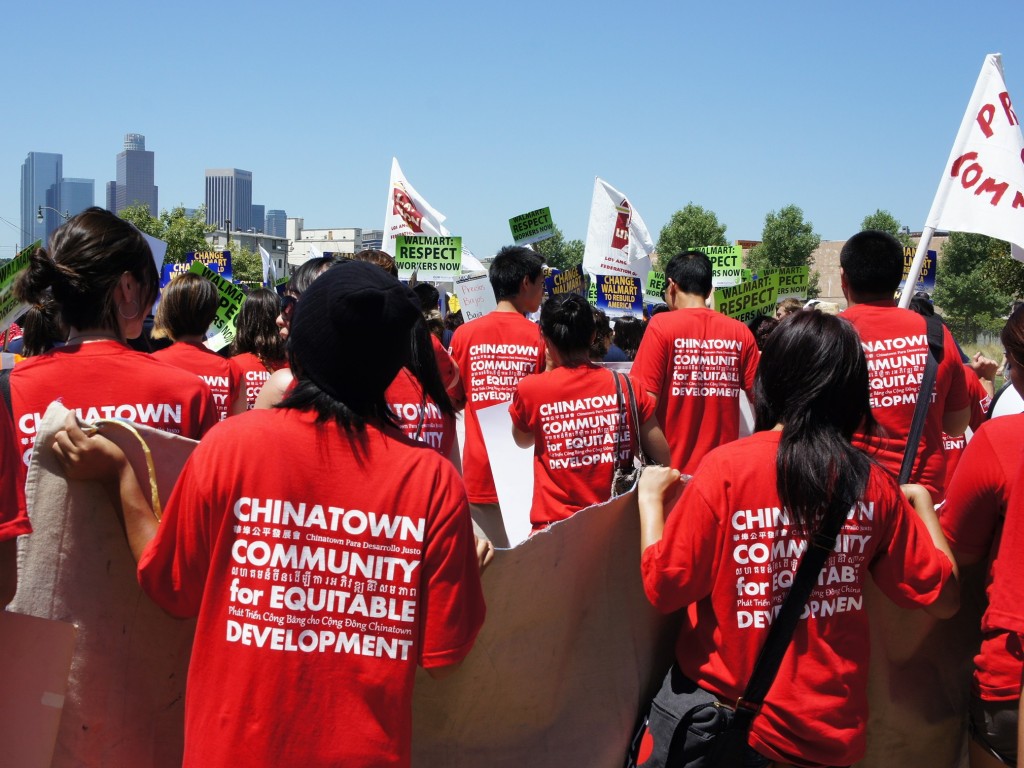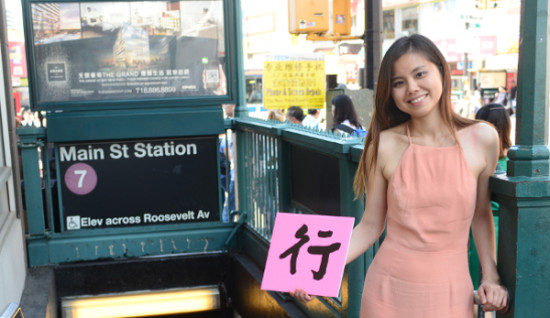When Flushing was a neighborhood of European immigrants in the 1940s, Pearl Chow’s was one of the sole Asian families there.
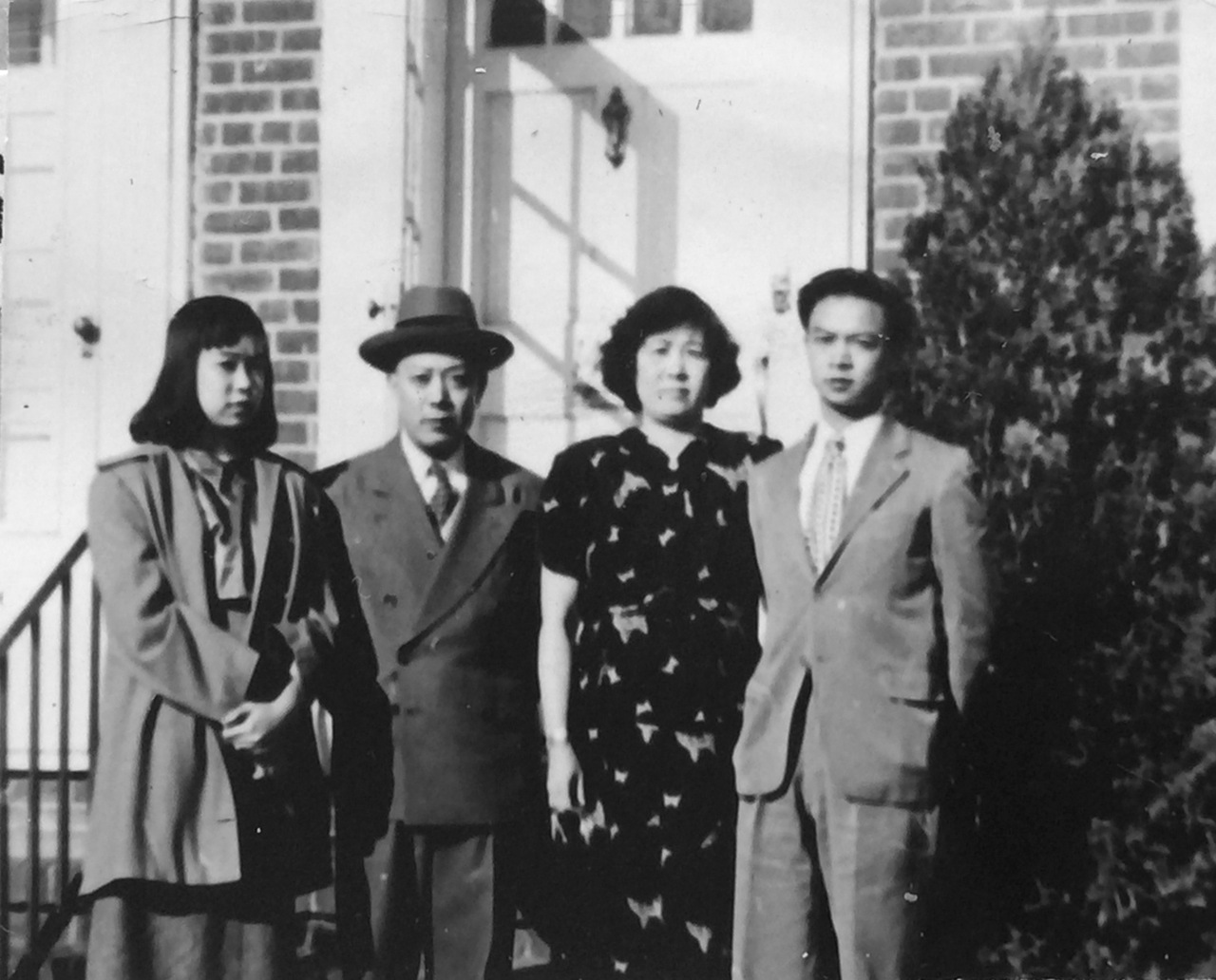
May 20, 2015
When I arrive at Dumpling Galaxy in Flushing, Queens, Pearl Chow has already befriended the waitstaff. “This is Eric,” she says, gesturing to a tall young man standing attentively at her side. “He’s very nice.”
Like her forward demeanor, Pearl’s choice of restaurant is emblematic of her adventurousness. I’d assumed a Flushing old-timer would pick an old classic, a restaurant she’s been patronizing for decades. But Pearl is more interested in trying out new spots. Dumpling Galaxy, a bright shiny place offering over 100 different types of dumplings, just opened on the second floor of a mall on Main Street, and we’re surrounded by young people.
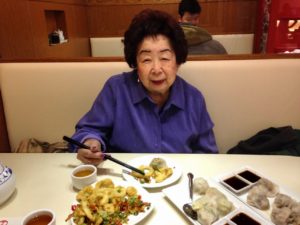
Pearl, age 70-something (“Don’t write my real age,” she says) is an all-American girl, born in Mississippi, raised in Queens, and able to remember a time when US Census data showed less than 75,000 Chinese living in the US.
She’s lived in Flushing since 1947, after a short stint packed into a small Manhattan apartment on “now-fashionable Riverside Drive,” as she puts it with a laugh, with her two parents and four siblings. Moving to Flushing meant graduating to a four-bedroom house. Pearl still lives in the old family house, not far off Main Street, though the rest of her family and everyone else from “the old days” have moved away.
In the 1940s, Pearl’s was one of the sole Asian families in a neighborhood of European immigrants. Today, there are around 34,000 people of Chinese origin living in the former Dutch colony, against 523,600 in all of New York, and about 4 million nationwide.
I met Pearl through Jean Lau Chin, a psychologist in New Jersey who grew up in Manhattan Chinatown, who is spearheading an oral history project to record memories of the neighborhood during the ’40s, ’50s and ’60s. People like Pearl, while not born in Chinatown per se, are considered part of the wider family. Indeed, many of Chinatown’s old-timers have long since moved to Queens, the greater New York suburbs, or elsewhere around the country. Dr. Chin recognizes that all of them hold valuable memories that will be gone within a decade or so.
For several hours by phone, and then in person over dumplings and fried squid, Pearl filled me in on life down South during the ’30s, and the changes she’s seen in New York from the ’40s to today.
How did your father end up in Mississippi?
That’s where the train went. My dad’s father worked on the railroads, 150 years ago. I think he hardly went back to China, but he went back long enough to sire my father. My father was born around 1900 and came over when he was 14. Somehow – actually I didn’t know this until recently – my cousin tells me his father had a laundry in New Orleans! You know the old people, they never told you those things. Another one was – I found a very old picture of my dad in white tennis slacks with a tennis racket. My dad played tennis?! That was when he was a bachelor I’m sure, in the ‘20s…So my father [went] to his dad’s in New Orleans who had a laundry down there.
Why did your father come over?
Like everybody else – poor and no jobs.
Then how did he go from New Orleans to Cleveland, Mississippi?
My father was involved with this grocery store called Chow Brothers [pronounced Zhou in Chinese]. Maybe with a bunch of partners – I don’t know, it must have been people from the village [in China]. My father worked there, shocked as hell – you know, you think of these Chinese people in the laundries and stuff.
And actually, I was born in the store. In the old days, children were born at home.
Tell me about your mother’s early life.
My mother got married at 16. It was match-made so it was probably the next village away. My mother was a Wong so, she came from the Wong village, whoever match-made them. She never talked about it.
What was life like for your mother in Mississippi?
My dad had a farm. Cotton, also soybeans, then later on when my cousin ran it there was rice. They had over 900 acres – I mean, that’s a lot of money.
Your mother must have been isolated here in New York too.
Oh that [moving here] was difficult for her. All her friends were down there. But she had two friends whose husbands migrated to the New York area. One of them – her husband had a restaurant in Brooklyn – I was named after. My name in Chinese is also Pearl; it’s very common.
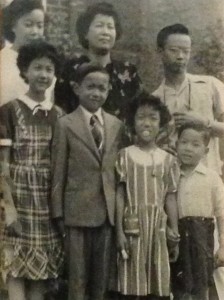
How did your parents wind up moving to New York?
[My father] was invited to join this import-export firm by some highly educated gentlemen, I think a father and a son. Stanley and Dr. Tso They were looking for my cousin but he was in University of Louisiana Baton Rouge. And so my father opened the mail and they were looking for someone to work in the Empire State Building’s import-export company.
The father and son had PhDs, which most Chinese, especially of that era, were not privileged to know. The younger son, Stanley, got a Harvard PhD when he was 24. And also they were from the upper class – well he was upper class by education alone already, but his wife was a translator for the UN. Eventually they went back to China.
Did you visit the Manhattan Chinatown growing up?
Yeah the Chows have – they call it a gong suo. [Associations that Chinese abroad belonged to, based on last name, that provided services, protection, social events, etc.] We went to the banquets once a year. They had these long, tedious speeches and they spoke in high Cantonese so you couldn’t even begin to understand what they’re saying. It’s not the common language that you speak on a daily basis. It’s like going to a PhD convention.
We weren’t a Chinatown family because we didn’t have a lot of relatives in the New York area. And I guess the people my father might have known would belong to that [name] association and they were laundry people, not restaurant people. Once we were grown we hardly went down [to Chinatown] at all.
Did you celebrate Chinese holidays growing up?
My mother wasn’t into that at all. I don’t know why. The only thing that I know from her customs was, you didn’t wash your hair on New Year’s and you didn’t wash your hair on your birthday. It’s bad luck. And the other thing – we weren’t even big on birthdays, but my parents, when we turned 21, they gave big parties, like dance parties. You know, you invited your friends and you could throw a party. And also, Chinese New Year you would get a red envelope.
What was Flushing like back then?
This was a very mixed neighborhood. There was a Catholic church probably four blocks from me and it still stands today. We belonged to the Lutheran church, about 10 blocks away. But this was a melange of different nationalities, and all native-born American. We had several Irish families, German families…I didn’t know any Italians, but it was really mixed.
There were absolutely no blacks here and when you bought the house you had to sign a covenant that you would not sell to blacks. That’s how far back it goes, you know, of discrimination. And there were zero blacks in the high school, zero blacks in the public schools. I was brought up in a very white neighborhood.
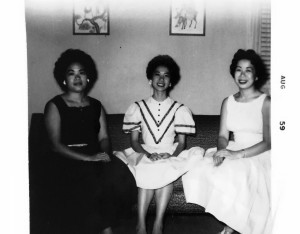
What was your social life like?
We all pitched in [at our father’s restaurant, then] we used to scatter after 9 or 10 o’clock and go to dances and so forth. I think my two sisters met their husbands through dances.
Oh it was a lot of fun, very casual – it was record hops, really. People would bring their records, so we would come from all over for those dances. To even meet Chinese people, it was really somethin’, cause you socialize with your local people, you know? They used to be at McBurney’s Y, which still exists on 23rd Street. And I don’t remember the place, it was like 82nd Street and Riverside Drive. . . . They had a couple up at Columbia University, given by Chinese clubs; that was a trek to go. We used to go bowling after the dances, at the Roxy bowling alley, which doesn’t exist today; it was across the street from the Time & Life building.
What else did you do to socialize?
CCYC, Chinese Christian Youth Conference, would do a camp away for the week. We slept in cabins, and did fishing… They had them in PA, Canada and Toronto, north of Toronto, and in upstate New York. Really Duchess County, but in the old days if you didn’t have a car everything was far away, so you had to catch a ride. That was my vacation. It was a big wow, that I saw Chinese for a whole week.
A couple of my friends met their husbands through that vehicle. That was important to us to have Chinese spouses; that’s what they preached.
And also we went to local colleges. My brothers were fortunate enough to be sent away to school. But that’s how the thinking was in those days…that the boys got the money. And they all finished college. Of the three girls I’m the only one that completed my upper years’ education. The other girls got married and became M-R-S’s.
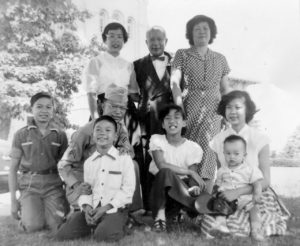
Where did you go to college?
I went locally, to Queens College, and got a degree in economics. I walked to school! How many people walked to college?
And tell me about your working life.
I worked for a Fortune 500 company, Unilever, for almost 40 years. I worked in Manhattan about 25 years, then they interviewed me and took me up to Connecticut, in 1988 or ‘87. I lived there during the week and had a terrific apartment; I’d love to bring it home. Then I drove home on weekends. I did sales forecasting and marketing. So, it’s a statistical job. Before I had that I worked in payroll.
I used to read a book a week on the subway, commuting into Manhattan from Flushing. Just junk books – I’m not a very deep person. But the thing was to keep myself occupied in the subway. Against the creeps!
What’s different about life now that Flushing has become another Chinatown?
I’m older, and because there are so many Chinese now around downtown Flushing – this has happened to me more than you would think: “Oh you speak English?” And I go, “Excuse me, this is my first language?” Holy mackerel. But you know, I guess they meet so many people that don’t speak English at all. I’m probably the rarity. Those 70,000 Chinese from my era, when I was born – where are they today?


